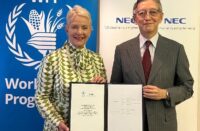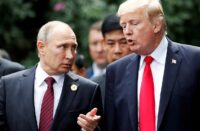 Ambassador Terence P. McCulley, the United States Ambassador to Nigeria recently granted an interview to the Economic Confidential magazine in Abuja. A career diplomat, McCulley started his career in Africa when he was posted to Niger, followed by assignments in South Africa, Chad and worked on Central African affairs. He also served as the Deputy Chief of Mission at the U.S. Embassies in Togo, Senegal, Tunisi, and Denmark. He was Consul in Mumbai, India and U.S. Ambassador to the Republic of Mali from 2005-2008 after working at the State Department in Washington in helping to coordinate reconstruction efforts in Iraq.
Ambassador Terence P. McCulley, the United States Ambassador to Nigeria recently granted an interview to the Economic Confidential magazine in Abuja. A career diplomat, McCulley started his career in Africa when he was posted to Niger, followed by assignments in South Africa, Chad and worked on Central African affairs. He also served as the Deputy Chief of Mission at the U.S. Embassies in Togo, Senegal, Tunisi, and Denmark. He was Consul in Mumbai, India and U.S. Ambassador to the Republic of Mali from 2005-2008 after working at the State Department in Washington in helping to coordinate reconstruction efforts in Iraq.
In this interview with the Economic Confidential, Ambassador McCulley, a recipient of four Department of State Superior Honor Awards, bares his mind on relationship between Nigeria and United States and other challenges confronting Nigeria as the Giant of Africa. Excerpts:
EC: The Economic Confidential notices that as a US diplomat, you have served in more African countries (Mali, Chad, Senegal, Togo, Tunisia and South Africa and now Nigeria) than in other continents. How would you describe African economic potentials considering the challenges on the ground?
There is enormous economic potential across Africa, and especially in Nigeria. As you noted, I have served in this region for nearly 27 years, and have always been impressed by Nigeria’s dynamism. Viewed from afar, of course, Nigeria can seem too complicated to understand, too difficult; a country with significant challenges, like corruption and insecurity. Viewed first hand, however, one comes to understand a country with unlimited potential and a people capable of overcoming any challenge.
EC: Since your posting to Nigeria, what have been your experience so far?
I arrived in this great and important country two years ago. I have to say that my initial impressions have been confirmed as I have travelled throughout Nigeria and met people of different backgrounds and experiences. I am terribly impressed with the potential and the energy of Nigeria. One of Nigeria’s most important resources, outside its oil and gas, is its people – energetic, dynamic and diverse; people who have remained together. Despite the over 250 languages and different ethnic groups, they remain united as proud Nigerians, despite the multiple challenges they face. Overall, I’m even more impressed today with Nigeria than I was when I arrived in October 2010.
EC: What has been the relationship between Nigeria and the United States of America?
The United States considers Nigeria our most strategic partner in Africa. Nigeria is also an important trading partner. Nigeria is our fifth largest crude oil supplier. Conversely, we see Nigeria as a potential market of 160 million people for U.S. exports. The U.S.-Nigeria Bi-National Commission (BNC) is an important vehicle to build on this relationship. We regard the BNC as a successful platform for visibly and consistently advancing shared U.S. and Nigerian interests in democracy, development, and security. Since Secretary of State (Hilary) Clinton and then-Secretary to the Government of the Federation Yayale Ahmed signed the framework in April 2010, all four of the working groups have convened: Good Governance, Transparency and Integrity; Energy and Investment; Niger Delta and Regional Security Cooperation; and Agriculture and Food Security.
EC: Could you give an example of such meetings?
We just concluded a Niger Delta working group meeting in Port Harcourt, which was the first time any of these meetings was held outside our two capitals. In these meetings, we engaged at a very high level with the government of Nigeria to talk about the problems and see where the US can be helpful. It was an incredibly successful meeting for both sides and more importantly convening the working group in the heart of the Niger Delta provided the rare opportunity for our Washington counterparts in particular to see the impact these discussions had on Nigerians.
Finally, the U.S. remains committed to this relationship and expanding it even more through trade and political channels. The U.S. is a friend to Nigeria and we view Nigeria a great friend to the U.S.
EC: We are aware that your country is partnering and supporting Nigeria in various ways, what are some of the major projects and programs being executed.
Nigeria is a country blessed with both abundant human and natural resources, and the United States seeks partnership not dependency; we seek to build capacity not undermine local initiatives. As Nigeria consolidates its democratic institutions and rebuilds its economy, the United States stands ready to help support of the country’s national priorities, such as public health, education, food and national security, containing malaria, eradicating polio, and helping millions of Nigerians living with HIV/AIDS.
EC: What of the cost of some of the programmes?
The President’s Emergency Plan for AIDS Relief, better known as PEPFAR, is our largest aid-based program with an annual budget of over $500 million and working towards an AIDS-free generation. PEPFAR is focusing on “combination prevention†including counselling and testing, with a special emphasis on three core interventions: treatment as prevention, voluntary medical male circumcision, and stopping the transmission of HIV from mothers to children. The U.S. Government-funded Malaria Action Program for States in Nigeria is another major health initiative under President Obama. Malaria is a major cause of morbidity and mortality in Nigeria. Because it directly affects school attendance and workers’ productivity, malaria can impose a heavy burden on poor households. USAID will provide $82 million to fund this activity for five years, improving the health of women and children in Nigeria with proven malaria prevention and treatment services. Combating polio is another health priority we are partnering with the government of Nigeria through administering of vaccines to care, and treatment of those already afflicted with this disease. As one of three countries still reporting new cases of polio yearly – Pakistan and Afghanistan are the other two — it is important for the health and safety of Nigerians and the world population we successfully fight the spread of this disease.
EC: Apart from investing in the health sector, what other sectors?
USAID has an agric-sector program in Nigeria called MARKETS, which supports farmers needing technical assistance to improve crop yield and understand better how to get crops to markets to sell at a good price. A commercial sector of MARKETS looks to improve rice yields, for example. We are working in Kano to support a state-of-the-art rice mill that produces rice for the local market. We are working in Benue State on some other projects. Earlier this year, I visited Oyo State and while there, visited two aquaculture enterprises in Ibadan, which have benefited from MARKETS’ technical assistance. We are also committed to assisting Nigeria’s important efforts to reform of the power generation and hydrocarbon sectors, including funding technical assistance for renewable energy initiatives.
EC: You have traveled to some cities and states in Nigeria. What do you consider as the major challenges bedeviling the country towards progress?
Clearly, this country faces significant challenges in terms of security, power, infrastructure and diversification of the economy. But this country has survived greater challenges, including prolonged periods of military rule and a divisive civil war. As I said, I think it is a country that profits from its diversity. Despite the challenges that Nigeria faces with Boko Haram and other issues, Nigeria is simply too important to be defined by its problems. Nigeria must be defined by its promise and its enormous potential, as well as the resourcefulness of its people. I expect Nigeria will play the role we and other friends hope and expect Nigeria to play on the international stage.
EC: How could the two countries improve their bilateral, especially trade relations?
If Nigeria can create an enabling environment for investment, including a frontal assault on corruption and lack of transparency and anchor the principle of the sanctity of contracts, I am convinced you will find American businesses and investors eager to enter the largest market in sub-Saharan Africa, creating jobs here in Nigeria, while offering expertise, innovation and some of the world’s finest products. The United States Energy Trade Delegation led by Deputy Assistant Secretary for African Affairs, William Fitzgerald met with President Goodluck Jonathan as well as then-Energy Minister Barth Nnaji, in Nigeria’s capital, Abuja in February, to discuss U.S. private sector interests to invest in the energy sector. The delegation, including executives from U.S. Export Import Bank and energy companies also met in separate meetings with officials of the Nigerian Electricity Regulatory Commission (NERC) and Independent Power Producers Association of Nigeria (IPPAN). The basic objective of the trade mission is to make significant progress on increasing U.S. private-sector investment in power infrastructure projects that have the potential to increase overall development in Nigeria.
EC: Could you cite some of the MoUs in that regards?
On October 19, 2011, the Export-Import Bank of the United States (Ex-Im Bank) and the Nigerian Ministry of Power signed a Memorandum of Understanding (MoU) aimed at securing up to $1.5 billion of U.S. exports of goods and services directed at a ten-fold increase in power output in Nigeria by 2020. Taking advantage of these opportunities as well as the Africa Growth and Opportunity Act (AGOA) would mutually advance our trade relations.
EC: What is the quantum in dollar or Naira terms, the contribution of America to Nigeria towards economic development and other projects
U.S. development assistance to Nigeria exceeds $600 million and Nigeria receives more than $5 billion in U.S. investment. And I see enormous opportunities for increased investment, growth and diversification of the economy outside oil and gas. Nigeria is the giant of Africa. I am very optimistic that Nigeria can be a more important commercial partner because we do have a very good relationship. CBN Governor, Sanusi Lamido has remarked a couple of times, and I agree with him, that Nigeria has enormous internal and huge regional market. While I welcome additional Nigerian export to the United States, there is also this Nigerian domestic market, which I think has enormous opportunities for American businesses to tap into.
EC: Nigerians are complaining bitterly about long process for obtaining US visa, months of waiting for interview and delay in release of passport, are you doing anything to address the problem?
I am happy to report a significant improvement in visa wait time, thanks to significant increased resources and support from Washingtonâ€â€Âshowing, once again, how much the U.S. values its relationship with Nigeria. Two years ago, the wait was 150 days in Abuja, but now the visa appointment wait time is less than 2 weeks in Abuja, and in Lagos it is less than a month. So get on line and apply for your visas – the wait time is minimal. And please, do not use touts. You don’t need them, and it’s a waste of your time and money.
EC: On average, how many visas does your embassy issue annually and do you intend to increase, by say next year?
The consular offices in Abuja and Lagos adjudicated more than 127,000 non-immigrant visa applications in the last 12 months, an 11 per cent increase over 2011. We anticipate the demand for U.S. visas to only increase at this rate in the next few years. Thanks for everyone’s interest in visiting the United States!
Source: Economic Confidential






